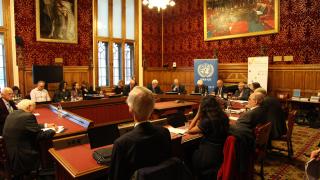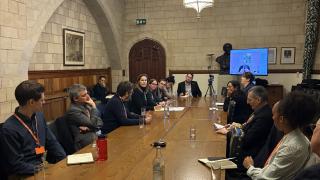
UNA-UK co-hosted a meeting of the All-Party Parliamentary Group on the United Nations (UN APPG) on 20 October to discuss the UK’s role within the UN and its potential impact on the future of development, humanitarian action and peace and security.
With the recent appointment of a new UN Secretary-General and the UK looking to secure its place as a world leader outside of the EU, the discussion came at a pivotal moment for UK-UN relations going forward.
It also marked the launch of the IDS Evidence Report, The UN at 70 and the UK: Development Cooperation, Humanitarian Action and Peace and Security – Lessons of Experience and Policy Recommendations - the conclusion of a year-long project by the British Association of Former UN Civil Servants, Institute of Development Studies and United Nations Association - UK to mark the United Nations' 70th anniversary.
The event was moderated by Lord Hannay, chair of the UN APPG, who opened proceedings by emphasising the interconnected nature of today’s challenges and the vital need for engagement with the UN by member states if issues such as climate change and mass migration are to be addressed.
IDS Director Professor Melissa Leach then introduced the Evidence Report and explained how the role of the UN is more important now than ever before, noting that Brexit is emblematic of the more uncertain world we face, environmentally, economically and politically. Professor Leach identified a key challenge for the UK as it balances its focus on negotiating Brexit, with the need to invest in multilateral-level relationships to maintain and grow its global standing.
The event then examined post-Brexit implications for the UK's relationship with the UN, with a particular focus on the three areas covered by the Evidence Report: development, humanitarian assistance, and peace and security. Short presentations were given by Sir Richard Jolly, Honorary Professor and Research Associate at IDS, University of Sussex; Sir Adam Roberts, Senior Research Fellow of the Centre for International Studies in Oxford University's Department of Politics and International Relations; and Sir Jeremy Greenstock, former UK ambassador to the UN and former Chair of UNA-UK.
Development
Sir Richard began by making the case that, post-Brexit, much of the Department for International Development (DFID)'s finance recently channelled to EU development funds should be redirected to the UN as opposed to the World Bank, which already receives a lion's share of DFID finance and often has a poorer record in poverty reduction and support for least-developed countries than the UN.
Sir Richard argued that this can and should be done in ways which strengthen the UK's voice within the UN's development agencies.
Humanitarian assistance
In relation to the UN’s historic role in providing life-saving assistance in situations of conflict, Sir Adam made several key observations, including the need for clarity over terms such as "protection" of civilians in conflicts, and the need for greater local legitimacy in UN humanitarian and peacekeeping operations.
Sir Adam also highlighted the need for more effective provisions for whistle blowers within UN agencies and operations.
His final remarks emphasised the importance of drawing effectively on previous experience and called for a high-level panel on humanitarian issues and for the UK to remain fully engaged with the UN on the issues of humanitarian action and conflict resolution.
Peace and security
Sir Jeremy emphasised the need for the UK to continue to earn respect through performance, especially by helping to solve international problems. If it fails to do so, said Sir Jeremy, the UK's legitimacy as a permanent member of the UN Security Council will be increasingly called into question by other UN member states.
Noting certain weakness in the UN's intergovernmental machinery, Sir Jeremy called on the UK to do more to assess and compensate for such weaknesses, especially in the areas of enforcement of international law and big-power disagreement over the maintenance of peace and security.
UN leadership and the UK's role
Sir Adam reflected on the negative character of the political discourse around Brexit and called for a more informed debate on the UK's relationships with international organsations - including among parliamentarians - based "on a sober assessment of the evidence". He cited the Witness Seminars as a useful source of that evidence.
Sir Richard Jolly praised the achievements of the UN and the crucial role it continues to play around the world. In referencing the need for a strong and effective UN, he acknowledged the significant impact UNA-UK’s 1 for 7 Billion campaign has had in opening up the selection process of the UN Secretary-General and expressed enthusiasm over the appointment of António Guterres.
Sir Richard continued by calling for stronger leadership throughout the UN system and highlighted the role that the UK should play in encouraging merit-based appointments and in setting a precedent by sending higher-calibre representatives to the United Nations.
His views were echoed by Sir Jeremy Greenstock, who reinforced the need for the UK to do more to invest in the health of the UN system. Sir Jeremy concluded by remarking that:
In theory, there is an opportunity for the UK to establish itself as an independent actor of great influence outside the EU... In practice, this will need courageous and imaginative leadership and a healthy economy. If these do not materialise, the risk of a breakdown in this long period of relative international peace will be that much higher because of the retreat of one of the most effective promoters of collective spirit and action.
The event was well attended by members of Parliament, NGO representatives and academics.






